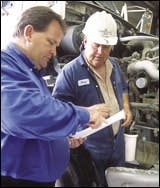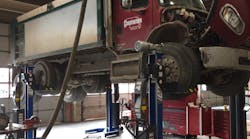Headquarters: Watsonville, Calif.
Specialties: Quarrying, highway and heavy construction, concrete and asphalt production
Equipment Makeup: 705 pieces of rolling stock, 250 licensed trucks, 4 asphalt plants, 7 concrete plants, 1 granite quarry, and 3 sand quarries
Support Staff: 60
Market Range: 150 mile radius of Watsonville
Q. Why would you leave oil in crankcases longer than 3,000 miles if that service interval has always delivered reliable mixer-truck life?
A. "The primary thing we're trying to get away from is premature service, which is costing us man hours," says Scott Holland, maintenance planner with Graniterock. "As hard as it is to find the right people to fill our mechanics' jobs, we have to recognize that oils have gotten better, filters have gotten better, parts in engines have gotten better, and we can change the way we service equipment. As long as we have good oil in the sump, we should leave it there."
The drive to improve preventive maintenance schedules began simply enough last summer when Buz Shaw, the Monterey Branch mechanic, asked Holland to upgrade engine oils. Graniterock has seven concrete branches, and each one was servicing equipment at different intervals. Three different brands of oil were being used. When Holland and Shaw started testing oils, the concrete-division manager challenged them to standardize engine oils, filters and service intervals across the seven divisions.
With the hope of justifying use of high-quality lubricants, in September of 2001 Holland stopped changing oil in all mixer trucks and started pulling oil samples for analysis at 3,000-mile intervals. For most of the past year, he has coordinated research using analysis results to probe the safe limits of oil life.
"We're not making an oil change until the analysis tells us the oil shows signs of failure," Holland says. (Oil sample analysis at 3,000-mile intervals also preserves the manufacturer's warranty coverage.)
As of July, the firm had not conducted a single regularly scheduled oil change on any of 135 trucks being tested. The service interval had not yet been clearly established, but there were engines reaching 15,000 miles with oil still in good shape.
"It's like adding more hands to our support staff without having to hiring more mechanics," Holland says. And that's critical, because the single mechanic at each of Graniterock's concrete plants not only is responsible for 25 or more pieces of mobile machinery, but also serves as the backup plant operator, maintains the concrete-reclaiming system and the storm-water system, and often operates a wheel loader during peak periods. "Those guys were just buried, and we didn't even know for sure if they needed to be doing as many services as they were doing."
Of course, equipment reliability is as important as a mechanic's time and the bottom line. All mixer trucks were fitted with pressure ports for taking oil samples and a supplemental bypass oil filter (the cotton-wound OilGuard product from MTM Industrial).
The live pressure ports make pulling oil samples a simple, two-minute procedure, and guarantee the quality of the sample. Evaluating the analysis results does require a bit more administrative discipline.
"You need to track makeup oil because every gallon you add refreshes the oil in the sump," says Holland. "We need to know how much oil is added so we can make an accurate assessment of oil in the engine."
Holland and his oil-analysis vendor are carefully monitoring oil oxidation and the levels of wear metals, soot and silicon to determine how well the oil is performing and how clean it is. Holland plans to take a class on oil analysis to improve his level of insight.
"I foresee setting a service interval somewhere between 20,000 and 30,000 miles," he says. "If we get a few trucks wearing out the oil at 28,000, some at 25,000, some at 24,000, we'll put a little safety buffer in and settle on something like 22,000 miles. That interval would eliminate about eight services per truck."
Trucks won't suffer from neglect because the oil-change interval is longer. State and federal safety guidelines assure that Graniterock's vehicles are inspected every 90 days. Plus, the operator's daily inspection will continue to bring problems to the mechanics' attention.
"The concrete trucks are just a control group," Holland says. "Once I have all the data and we have a reliable PM program for mixer trucks, I'm going to take this to the rest of the company.
Anticipating this expansion, Holland has begun to track the fuel consumption of equipment based at the Monterey concrete plant. Holland knows that fuel use is a better measure of how hard different engines work than hours or miles of operation. It's another discipline intended to refine Graniterock's maintenance control and spend technician labor hours where they contribute most to Graniterock's bottom line.
"Looking at fuel use and hours worked on loaders, for example, is allowing us to compare workloads," he says. "Machines that don't work as hard are using less of the oil's life. They should go longer between oil changes."
Oil-analysis results on all 35 machines at the site where Buz Shaw works are being analyzed to determine a safe oil-change interval. Oil is being changed in off-road machines at twice the normally recommended service interval. Before beginning the program, Shaw had been supported by an outside vendor that was doing basic service on the location's 10 forklifts. That vendor expense is no longer necessary.
"Times have changed, and if we want to be competitive, we have got to stop accepting things just because that's the way we've done them for 20 years. Equipment manufacturers aren't going to change their service intervals in these severe applications because they have to warranty their engines. But as long as we do a good job with oil sampling and analysis, we can keep their warranty support and cut our maintenance and labor costs substantially."
 Holland and mechanic Buz Shaw review oil-analysis results on a truck that hasn't had an oil change since 2001.
Holland and mechanic Buz Shaw review oil-analysis results on a truck that hasn't had an oil change since 2001.



